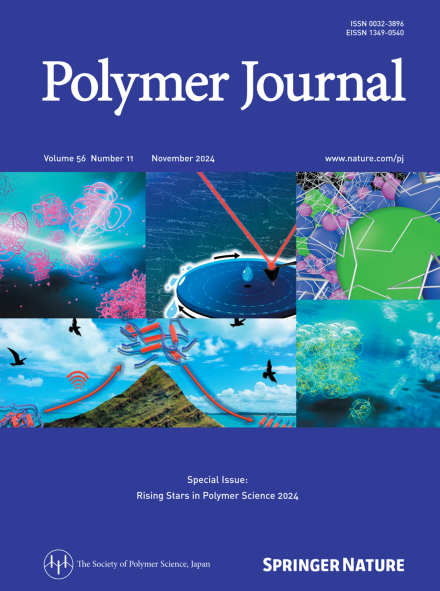Anionic polymerization driven by flow microchemistry
IF 2.3
4区 化学
Q3 POLYMER SCIENCE
引用次数: 0
Abstract
This focus review describes advancements in anionic polymerization achieved using flow microreactors. Anionic polymerization using traditional flask chemistry often requires extremely low temperatures and complex setups; thus, it is unsuitable for large-scale production. Flow microreactors, with features such as precise temperature control, rapid mixing, and precise time control, can overcome these limitations. Using these microreactors, otherwise impossible polymer synthesis reactions can occur, and a controlled molecular weight distribution and high reaction selectivity is attained. Due to the ability to perform reactions at high temperatures without excessive cooling, this method is environmentally friendly and cost-effective. Additionally, precise time control allows the use of highly unstable polymer chain ends and functionalized alkyllithiums for further reactions, facilitating the synthesis of heterotelechelic polymers. Similar to those in laboratory-scale experiments, the continuous operation of the flow microreactors can be used to scale up the reaction under conditions, demonstrating their potential for industrial applications. This focus review highlights the significant contributions of flow microreactors to polymer production and facilitates future advancements in high-speed, environmentally benign polymer synthesis. Our recent studies on the anionic polymerization achieved using flow microreactors are reviewed. Using flow microreactors, with features such as precise temperature control, rapid mixing, and precise time control, otherwise impossible polymer synthesis reactions can occur. Some typical examples synthesizing polymers with reactive functional groups and heterotelechelic polymers are described. This review also highlights the in-line analyses of the polymer living end, helping a deeper insights of the reaction and its conditions. The continuous operation of the flow microreactors demonstrated their potential for industrial applications.

流动微化学驱动的阴离子聚合
本文重点综述了利用流动微反应器实现阴离子聚合的进展。阴离子聚合使用传统烧瓶化学通常需要极低的温度和复杂的设置;因此,不适合大规模生产。流动微反应器具有精确的温度控制、快速混合和精确的时间控制等特点,可以克服这些限制。使用这些微反应器,可以发生不可能的聚合物合成反应,并获得可控的分子量分布和高反应选择性。由于能够在高温下进行反应而不需要过度冷却,因此这种方法对环境友好且具有成本效益。此外,精确的时间控制允许使用高度不稳定的聚合物链端和功能化的烷基锂进行进一步的反应,促进杂远螺旋聚合物的合成。与实验室规模的实验类似,流动微反应器的连续操作可用于在条件下扩大反应规模,展示其工业应用潜力。本文重点综述了流动微反应器对聚合物生产的重要贡献,并促进了高速、环保聚合物合成的未来发展。综述了近年来国内外在流动微反应器中阴离子聚合的研究进展。使用流动微反应器,具有精确的温度控制、快速混合和精确的时间控制等特点,否则不可能发生聚合物合成反应。介绍了合成反应性官能团聚合物和杂远螺旋聚合物的一些典型例子。这篇综述还强调了聚合物活性端的在线分析,有助于更深入地了解反应及其条件。流动微反应器的连续运行证明了其工业应用潜力。
本文章由计算机程序翻译,如有差异,请以英文原文为准。
求助全文
约1分钟内获得全文
求助全文
来源期刊

Polymer Journal
化学-高分子科学
CiteScore
5.60
自引率
7.10%
发文量
131
审稿时长
2.5 months
期刊介绍:
Polymer Journal promotes research from all aspects of polymer science from anywhere in the world and aims to provide an integrated platform for scientific communication that assists the advancement of polymer science and related fields. The journal publishes Original Articles, Notes, Short Communications and Reviews.
Subject areas and topics of particular interest within the journal''s scope include, but are not limited to, those listed below:
Polymer synthesis and reactions
Polymer structures
Physical properties of polymers
Polymer surface and interfaces
Functional polymers
Supramolecular polymers
Self-assembled materials
Biopolymers and bio-related polymer materials
Polymer engineering.
 求助内容:
求助内容: 应助结果提醒方式:
应助结果提醒方式:


